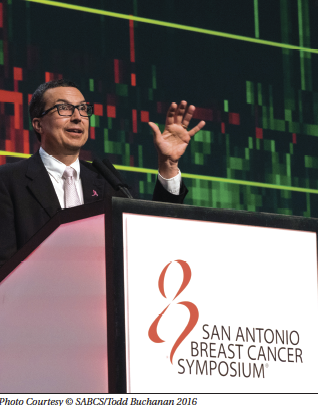ADVERTISEMENT
Biosimilar Pegfilgrastim Equally as Effective, Safe as Neulasta
 Recent research presented at the 2016 San Antonio Breast Cancer Symposium showed that a biosimilar version of Neulasta (pegfilgrastim; Amgen) was equally as safe and effective when compared to the reference product, among patients with breast cancer receiving myelotoxic chemotherapy.
Recent research presented at the 2016 San Antonio Breast Cancer Symposium showed that a biosimilar version of Neulasta (pegfilgrastim; Amgen) was equally as safe and effective when compared to the reference product, among patients with breast cancer receiving myelotoxic chemotherapy.
“Biosimilars are highly similar to a biological reference product with no clinically meaningful differences in terms of efficacy and safety,” Kimberly Lynn Blackwell, MD, professor of medicine at the Duke University School of Medicine, and colleagues wrote. “Here we present the pooled analysis of two randomized trials (PROTECT1 and 2) comparing the efficacy, safety, and immunogenicity of proposed biosimilar pegfilgrastim (LA-EP2006) with [Neulasta].”
In order to study how the biosimilar product compared to Neulasta, the researchers conducted two phase 3 studies, with 624 chemotherapy-naïve patients with breast cancer scheduled to receive less than six cycles of chemotherapy with docetaxel, doxorubicin, and cyclophosphamide. The researchers categorized patients into two study groups, a group which received LA-EP2006 injections and a group that received Neulasta. Both groups began receiving injections on day 2 of each chemotherapy treatment cycle.
Primary outcomes included duration of severe neutropenia, and equivalence in outcomes between study groups. The secondary outcomes included incidences of febrile neutropenia, fever and infections, depth of absolute neutrophil count (ANC) nadir and time to ANC recovery, and assessment of product safety.
Duration of severe neutropenia was statistically equivalent between both study groups. Furthermore, incidence of febrile neutropenia were slightly reduced among patients receiving LA-EP2006 injections, across all chemotherapy cycles (8% vs 10.3%).Additionally, frequency of fever and infections were similar in both study groups.
Safety outcomes were also similar between the study groups, with serious treatment-emergent adverse events reported in 14.3% LA-EP2006 patients, vs 17.1% of Neulasta patients. —David Costill






















